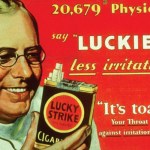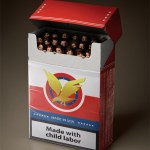tobacco
At the Intercept, Avi Asher-Schapiro reports on a new insurance plan that Uber is offering its drivers that could help them recoup wages and cover medical expenses if they’re injured on the job. Asher-Schapiro notes that while some have described the Uber insurance plan — which workers buy by setting aside 3.75 cents per mile — as a form of workers’ compensation, it hardly fits the bill. In fact, in documents obtained by the Intercept, Uber explicitly states that the insurance plan isn’t workers’ comp. He writes:
Compared to traditional workers’ compensation insurance, Uber’s policy…
In a recent study, Harvard public health researchers decided to test a few dozen types of electronic cigarettes for diacetyl, a flavoring chemical associated with a severe respiratory disease known as “popcorn lung.” The researchers found diacetyl in a majority of the e-cigarettes they tested. News outlets jumped on the findings, with some announcing that e-cigarettes could cause the often-debilitating respiratory disease.
But scientist Joseph Allen wants to be clear: His study doesn’t make a definitive statement about the effect of diacetyl in e-cigarettes. Instead, Allen said his goal was…
The Centers for Disease Control and Prevention recently released the first nationally representative estimates of electronic cigarette use among U.S. adults, finding that more than 12 percent had ever tried the aerosol nicotine products in 2014. So, as is the unfortunate case with many emerging and potential public health threats, it seems like e-cigarette use is outpacing the ability of regulatory bodies to protect the public’s health and educate consumers about possible risks.
The new data is from CDC’s National Health Interview Survey, which first began collecting data on e-cigarette use…
For part of this summer, I escaped the sweltering heat of central Texas and took refuge in Leamington, Ontario, Canada. It's a lovely place in southern Ontario on the banks of Lake Erie. From my sister's cottage, I could see Pelee Island on the horizon.
On a morning walk, the nose of my golden retriever Laredo drew me to a small, smashed cardboard package. It was an empty pack of DK's Full Flavor Premium Canadian Blend cigarettes. But the product and brand on the label were dwarfed by the graphic warnings on four of the six sides of the box.
A cigarette pack I found on the side of the…
Because there can never be enough research to illustrate the positive impact of public health policy on people’s health, here’s another one. This one found that comprehensive smoke-free indoor air laws resulted in a lower risk of asthma symptoms and fewer asthma-related doctor’s visits.
Based on 2007–2011 data from the Behavioral Risk Factor Surveillance System, researchers set out to evaluate whether comprehensive statewide indoor smoking bans are effective in reducing secondhand smoke exposure among nonsmoking U.S. adults. (Comprehensive smoking bans are defined as eliminating smoking in…
And now for something completely different...but depressingly the same in some ways.
Longtime readers—and I do mean longtime—might remember from several years ago a certain case adjudicated before the Vaccine Court. I'm referring, of course, to the Autism Omnibus. In Autism Omnibus, some 4,800 claimants were bringing action seeking compensation for "vaccine injury" characterized by autism. Basically, it was a large number of parents who thought vaccines had caused their children's autism seeking compensation from the Vaccine Court, and they implicated the MMR and thimerosal-containing…
Even though farmworkers face serious hazards on the job and work in one of the most dangerous industries in the country, most young farmworkers in a recent study rated their work safety climate as “poor.” In fact, more than a third of those surveyed said their managers were only interested in getting the job done as quickly as possible.
Recently published in the American Journal of Public Health, the study was designed to capture perceptions of work safety climates on North Carolina farms that employ children and teens and the association with occupational safety and injuries. In partnering…
In just a year, electronic cigarette use has tripled among American teens. And considering that no one really knows what the related health impacts are and any regulatory framework is lagging far behind the growing popularity of e-cigarettes, public health advocates say it’s time for action.
Earlier this week, the Centers for Disease Control and Prevention released new data from the 2014 National Youth Tobacco Survey finding that current e-cigarette use among high school students, which is defined as using at least once in the prior 30 days, nearly tripled — from 4.5 percent in 2013 to 13.4…
By Anthony Robbins, MD, MPA
So screams a headline in the New York Times business section on July 12, 2014. Two of the three tobacco companies in the $100 billion US market plan to merge.
Fifty years after the Surgeon General’s first report on Tobacco and Health, the US tobacco industry is working to grow its profits. Will the universal consensus that cigarettes kill have any effect on a government decision whether to intervene in the proposed merger? The Government usually gets involved when a merger would reduce the number of sellers in the market, possibly reducing competition…
“I got a headache before. It was horrible. It felt like there was something in my head trying to eat it.”
Those are the words of a 12 year-old boy who works in the tobacco fields of eastern North Carolina. His words are just one of many from other young seasonal workers who work on U.S. tobacco farms in KY, NC, TN, and VA. Their experiences are catalogued in Human Rights Watch’s (HRW) "Tobacco’s Hidden Children: Hazardous Child Labor in US Tobacco Farming.” The report was released last week.
Credit: Human Rights Watch
The 139-page report was also the subject of editorials…
This year’s County Health Rankings once again illustrate why geography and good health go hand-in-hand. They’re also a poignant reminder that there may be no better way to improve health for all than by focusing on the social determinants of health.
Released earlier this week, the 2014 County Health Rankings compare each state’s counties on 29 factors that impact health, from tobacco use to high school graduation rates to access to healthy food choices. In examining the differences between counties, the report found that the least healthy counties were home to twice the premature death rate,…
Now we come to a post in which Orac unloads a bit about one of his pet peeves. It is a post that will likely piss a few people off on "his" side. If it does, so be it. He does this now because yesterday something happened that irritated the crap out of me because it put on display one of the less appealing characteristics of the skeptical movement, a tendency to obsessively focus on what it views as important at the expense of losing touch with the big picture. It is a story about knee jerk responses to which we all (myself included) fall prey.
Yesterday it was widely reported in the media,…
It’s probably my earliest public health memory — the image of Surgeon General C. Everett Koop and his grandfatherly beard on the television warning my elementary school self about the dangers of smoking. He was the first doctor I knew by name.
But while Koop may be the surgeon general that people of my generation most likely associate with the public health movement to reduce smoking, he wasn’t the first to speak out against tobacco. Koop was carrying on a legacy that began decades before with the nation’s ninth surgeon general, Luther Terry, who on Jan. 11, 1964, released the first surgeon…
A coalition of public-health organizations, including the Robert Wood Johnson Foundation (RWJF) and Campaign for Tobacco-Free Kids, has released a report criticizing most U.S. states for under-investing in smoking prevention and cessation. Broken Promises to Our Children: The 1998 State Tobacco Settlement 15 Years Later calculates that states over the past 15 years, states have collected a total of $391 billion from tobacco settlements and tobacco taxes, but spent only 2.3% of that amount on tobacco prevention programs.
The report compares states’ tobacco-prevention expenditures to the levels…
The U.S. "war on drugs," besides failing to meet its goals, has demonstrated a stubborn ignorance of the effects that different drugs have in the human body. Granted, some drugs cause degeneration and are properly outlawed. Opiates such as heroin and stimulants such as cocaine and methamphetamine take a harsh physical toll and leave users addicted to the chemical. But classified along with these truly dangerous drugs are some of nature's most mysterious medicines. New research shows how marijuana, psychedelics, MDMA and even ketamine have positive physiological and psychological effects that…
When Senator Frank Lautenberg (D-NJ) passed away Monday at the age of 89, the Senate lost one of its longest-serving members and the US lost a public-health champion. Brad Plumer at the Washington Post's Wonkblog describes several of Senator Lautenberg's achievements, including banning smoking on airplanes, preventing people convicted of domestic violence misdemeanors from owning guns, and requiring states to raise their drinking ages to 21 and lower the drunk-driving blood alcohol threshold from .10 to .08. The Washington Post's Juliet Eilperin writes about Lautenberg's…
by Kim Krisberg
Another day, another study that shows investing in public health interventions can make a serious dent in health care spending.
A new study recently published in the American Journal of Preventive Medicine found that banning smoking in all U.S. subsidized housing could yield cost savings of about $521 million every year. That total includes $341 million in secondhand smoke-related health care expenditures, $108 million in renovation expenses and $72 million in smoking-attributable fire losses. In fact, just prohibiting smoking in public housing alone would result in a savings…
by Anthony Robbins, MD, MPA
Can we really consider "end game strategies" for tobacco? An Op-Ed in the New York Times makes a strong case for ending tobacco use. Let me begin with some history.
The World Health Organization's (WHO) Framework Convention on Tobacco Control, adopted in 2003, was developed in response to globalization of the tobacco epidemic. The Framework's objective is to protect present and future generations from the devastating health, social, environmental and economic consequences of tobacco consumption and exposure to tobacco smoke. Unlike previous drug…
I know I dump on a website known as The Thinking Moms' Revolution (TMR), but I do so with good reason. Given what a wretched hive of antivaccine scum and quackery that website is, rivaling or surpassing any antivaccine website I can think of, even the blog equivalent of the great granddaddies of wretched hives of antivaccine scum and quackery, the National Vaccine Information Center (NVIC), and, of course, Age of Autism. As a result, increasingly I've been taking more and more notice of this (not so) Thinking Mom's Devolution. As a result, I became aware of a particularly egregious piece of…
Could we have taken action earlier to prevent harm from tobacco, asbestos, and lead? That's the question at the core of the European Environment Agency's (EEA) collection of case studies, which was released this month as Volume 2 "Late lessons from early warnings: science, precaution, innovation."
The publication features articles on those nefarious health hazards, as well as ones about beryllium, Bisphenol A, the pesticides DBCP and DDT, mercury, perchlorethylene, and vinyl chloride. Protecting ecosystem, including aquatic environments exposed to ethinyl oestradiol (synthetic…



